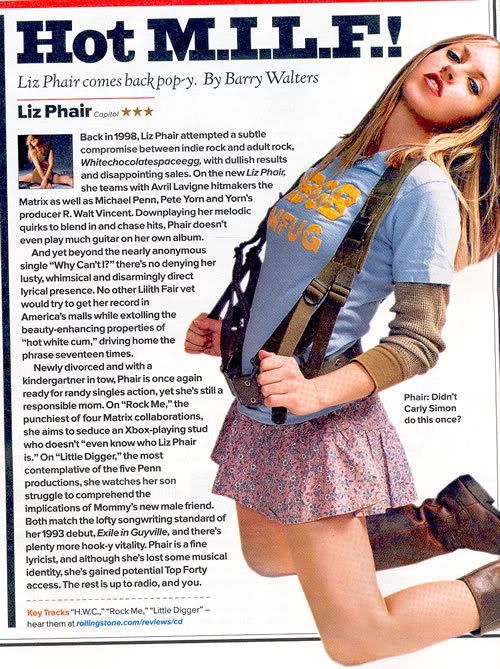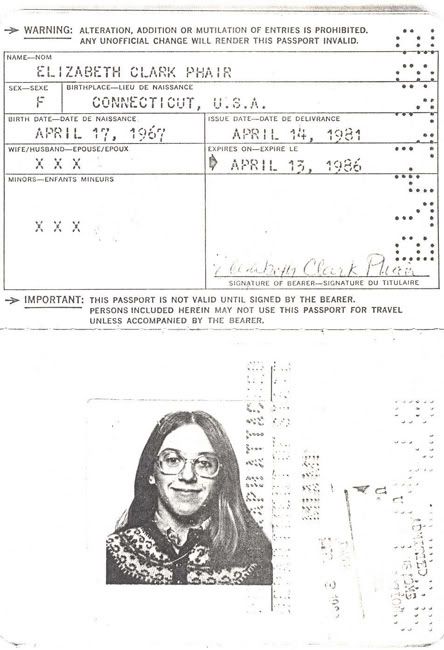You can read Tyler's celebration of Exile in Guyville here.

Liz Phair and the Guys of Guyville
by Tyler Coates
I listened to pretty terrible music when I was growing up. I didn't start watching MTV until I was in the sixth grade, which was already 1994. I remember that the first video I saw was Aerosmith's "Livin' on the Edge," which, as slightly sheltered eleven year old, was mind-blowing.
Now, at almost twenty-five, I look back on how Aerosmith was my favorite band for years - they were my first concert in the summer of 1997 - and that was before I collected Dave Matthews Band's entire catalogue. But, honestly, I had no way of hearing the good music that I was missing out on in the early '90s.
When I went to college and discovered ethernet and Limewire, music exploded into my head; that was the year I discovered Exile in Guyville. It's funny that then, at eighteen, I thought I had had all of the heartbreak I could handle, and somehow Liz's songs were meaningful to me. (Granted, it was the lines like "it's harder to be friends than lovers," that really affected me; "Fuck and Run" didn't hit me too hard, as there wasn't any fucking from which to run.)

Now that I'm around the same age as Liz when she wrote her iconic songs, I sure can relate to the themes of finding who you are and who you want to be - all the while finding someone with whom you want to share your time. But am I - the guy in his mid-twenties - supposed to find something of myself in her music?
Is Exile in Guyville a manifesto of third-wave feminism, complete with open and proud female sexuality? One could certainly say that; Liz embraces her sexuality but never describes it as promiscuity. (In fact, it is, as Liz describes it now, much sadder than it played fifteen years ago.)
"Sometimes A Dream (Is What Makes You A Slave)" - Liz Phair (mp3)
It's hard to believe that in 1993 she was a pioneer for women who wanted to speak their minds (there was her bawdy predecessor Marianne Faithfull and her contemporaries Courtney Love and PJ Harvey), but she certainly influenced the toned-down, VH1-friendly "women in rock" like Alanis Morissette. And hey - she called herself a "cunt" way before The Vagina Monologues reclaimed the word in the late '90s.

A lot of people applaud Liz Phair for her honesty and candor, but even she seems to downplay it when she looks back on her twenty-something self. In a recent interview with Elle, she says, "People thought it was this straight-up confessional diary of this naive person. I thought, 'Don’t you get it’s kind of funny and I kind of know what I’m doing?' But I’m not even sure that it comes through when I listen to Guyville now. When I listen now I think, That’s revealingly sad. I feel bad for myself because I can feel the pain. But at the time, I thought I was being quite clever, turning things on their head, sticking humor and wit in there."
"Can't Get Out Of What I'm Into" - Liz Phair (mp3)
Liz has also called the album a "fuck you" to the male-dominated music scene in the early '90s, particularly the hipster-fueled neighborhood of Wicker Park in Chicago. Taking the term from a song by fellow Chicagoans Urge Overkill, the album's title seems to describe Liz Phair's place in the music industry, not only as the it-girl of indie rock, but as 41-year-old female musician trying to navigate the music game, appeasing the mostly male producers, executives, and critics.

In anticipation of the album's reissue, Liz Phair has taken part in several interviews with male critics who seem to belittle her as they ask her inane questions. There's a notoriously bad example in Time Out Chicago, where the interviewer admits that his friend told him to ask her "why she sold out," to which Liz replied, "Ask him why he’s a walking cliché." Of course, this is after a few questions about what it's like to be hated in the music industry.
In another interview with Rob Trucks of Village Voice, Liz lashes out at the critics who mostly fueled the near-universal panning of her self-titled "pop" album: "Get mad at the record. Throw it across the room. Get really angry at it. Step on it. Burn it. You can do whatever you want. But, like, it is unhealthy for someone to assume that they know someone, or have any...when they don't know me. That's just inappropriate."

Fun fact: Liz Phair was interviewed on Bob Costas' show on HBO. It makes me ask the question: why the fuck was Bob Costas interviewing Liz Phair?
A perfect example of a male critic's reaction to Exile in in Pitchfork's review of the fifteenth anniversary reissue. For the majority of the article, critic Chris Dahlen laments on how it feels to be a man listening to the album, and claims that without the men in her life, Liz Phair would not be able to create the record.
"Ant In Alaska" - Liz Phair (mp3)
"It was the guys like her Johnny or her Joe - the titular guys in the indie boy's club centered in and around Chicago's Wicker Park - who preened for her, dicked her over, and taught her how to push back, inspiring her and making it necessary for her to write these songs in the first place."

Can I please just read a review of a Liz Phair record that doesn't reduce her into such a polarizing musician? One that might possibly written by a female music critic? Or, if it must be a male writer, could he not invoke the conceit that to be a male Liz Phair fan one must be either overly sensitive or extremely horny and lusting for Liz's blow job queen?
I'd love to finally read a criticism of Liz Phair that recognizes her music as being fully accessible, and that one does not necessarily need an agenda in order to enjoy it.
Tyler Coates is the contributing editor to This Recording. His blog is here, and his tumblr is here.
MORE CLASSIC LIZ PHAIR DEMOS AND RARITIES (PHAIRITIES?)
"Conversation Overheard Between Two Bouncers" (mp3)
"If I Ever Pay You Back" - Liz Phair (mp3)
"South Dakota" - Liz Phair (mp3)
"Flower" - Liz Phair (mp3)
"Fuck and Run" - Liz Phair (mp3)

PREVIOUSLY ON THIS RECORDING
Screwball Comedies and the Ladies Who Love Them

Liz Phair: Juvenilia